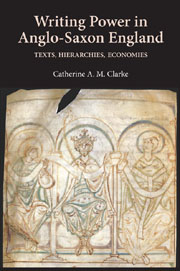Book contents
- Frontmatter
- Contents
- Acknowledgements
- Abbreviations
- Introduction
- 1 Order and Interlace: the Guthlac Poems of the Exeter Book
- 2 Sites of Economy: Power and Reckoning in the Poetic Epitaphs of the Anglo-Saxon Chronicle
- 3 ‘Absens ero … presens ero’: Writing the Absent Patron
- 4 Power and Performance: Authors and Patrons in late Anglo-Saxon Texts
- 5 Remembering Anglo-Saxon Patronage: the Libellus Æthelwoldi Episcopi and its Contexts
- Afterword
- Bibliography
- Index
- ANGLO-SAXON STUDIES
Introduction
Published online by Cambridge University Press: 05 February 2013
- Frontmatter
- Contents
- Acknowledgements
- Abbreviations
- Introduction
- 1 Order and Interlace: the Guthlac Poems of the Exeter Book
- 2 Sites of Economy: Power and Reckoning in the Poetic Epitaphs of the Anglo-Saxon Chronicle
- 3 ‘Absens ero … presens ero’: Writing the Absent Patron
- 4 Power and Performance: Authors and Patrons in late Anglo-Saxon Texts
- 5 Remembering Anglo-Saxon Patronage: the Libellus Æthelwoldi Episcopi and its Contexts
- Afterword
- Bibliography
- Index
- ANGLO-SAXON STUDIES
Summary
This study combines close textual analysis, a range of theoretical frameworks and attention to historical and cultural contexts to explore how power is imagined, represented and shaped in later Anglo-Saxon written sources. In particular, it identifies and examines the ways in which late Anglo-Saxon texts present structures of hierarchical or vertical relationship alongside patterns of reciprocity and economies of interaction and obligation between individuals and groups. The sources discussed throughout this book sustain double ways of seeing and understanding power, generating a range of imaginative and ideological possibilities, as well as possible tensions, ambiguities and instances of disguise or euphemism. Close reading also reveals the ways in which the texts themselves initiate complex economies between authors, patrons and audiences, drawing individuals into processes of exchange, reciprocity and mutual dependence which can both mirror and re-model wider networks of social or cultural power and inter-relationship. The five chapters of this book cover a deliberately diverse selection of texts which encompass different languages (Latin and the vernacular), genres, readerships and modes of circulation, illustrating the ways in which different literary forms engage with questions of power in varying ways according to changing formal conventions, available rhetorical strategies and the demands of their historical contexts and agendas. Whilst each text negotiates concepts of power and inter-dependence in specific ways, the fundamental inter-play between hierarchy and economy emerges, in nuanced and shifting forms, across all the late Anglo-Saxon writing examined in this study.
- Type
- Chapter
- Information
- Writing Power in Anglo-Saxon EnglandTexts, Hierarchies, Economies, pp. 1 - 10Publisher: Boydell & BrewerPrint publication year: 2012



